This week, it appears that a few Star Alliance member airlines have launched an offensive against third-party websites that scrape loyalty program websites for award availability and sell the aggregated data to users.
This can make it a lot more challenging for savvy travellers to search for award seats going forward, and it’s also a part of the much broader issue of limited award availability across the board that’s been affecting the industry over the past year or so.
Let’s take a look at everything that’s happened so far.
What Brings Us Here Today
There’s been a lot of chatter about award availability in the Miles & Points world lately, particularly in the context of the misuse of loyalty programs by bad-faith actors.
Last week, our friend Anshul at Points Miles and Bling hosted a livestream with Mark Nasr and Scott O’Leary, two of Aeroplan’s executives.
During the conversation, the executives provided a lot of insight into Air Canada and Aeroplan, including aircraft cabin refurbishments, lounges, the recent targeted status extension promotion, and more. If you didn’t tune in, and if you’re interested in any of these topics, I’d encourage you to give it a watch.
The issue of partner award availability was brought up, and discussed in detail, beginning at around 1 hour and 10 minutes into the call.
We recently published our thoughts on what’s happening with Aeroplan partner award availability, and we gained some more insight into Aeroplan’s behind-the-scenes approach during the call.
Aeroplan’s leadership summarized five issues that have been affecting partner award availability on Aeroplan as of late, outlined as follows:
- Some partners have shifted their business strategies since partnering with Aeroplan (e.g., pursuing membership in alliances that aren’t Star Alliance)
- Some partners have ongoing IT issues, including antiquated technology, which sometimes results in the fallout of award availability
- Fraud and program misuse
- Third-party websites that scrape the Aeroplan website for award availability
- Phantom award availability (i.e., even if awards show as available on other platforms, in reality, they aren’t actually available at all)
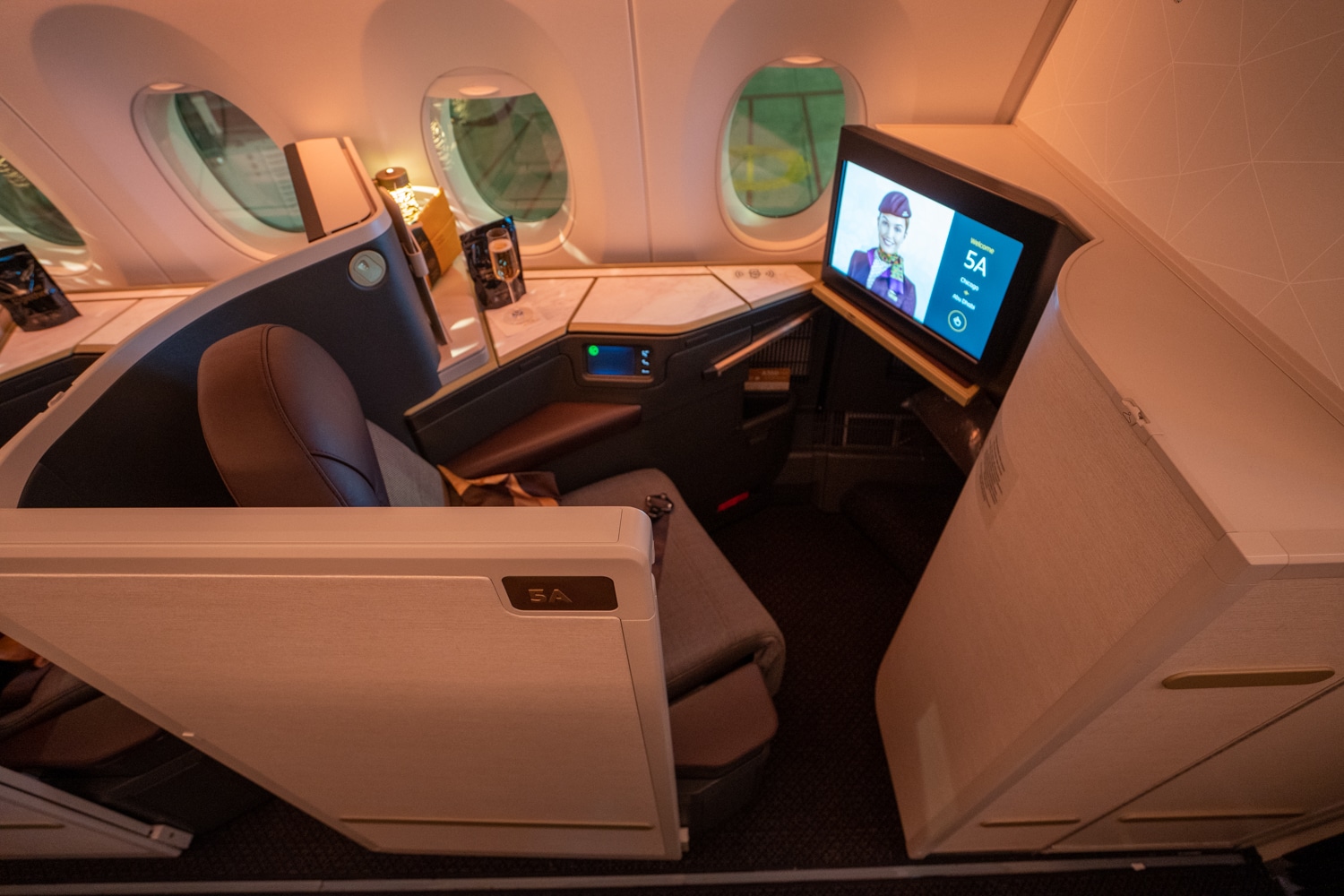
Aeroplan’s leadership went on to explain that the sum of these issues has resulted in Aeroplan not being able to offer some awards on their digital platform, or in awards not being available at all. This materially affects the user experience on Aeroplan, and Aeroplan is acting to address these issues.
In particular, the issue of third-party websites that scrape the Aeroplan website for award availability has really come to a head this week.
Third-Party Award Availability Websites Brought to the Spotlight
In last weekend’s livestream, Aeroplan’s leadership outlined that in the past, some individuals had built well-intentioned, albeit unauthorized, tools that access Aeroplan’s technology and data.
Broadly speaking, these tools comb loyalty websites’ data and summarize award availability for days, weeks, and months at a time, thereby helping individuals find award availability that would otherwise be difficult or time-consuming to find by searching directly on the Aeroplan website.
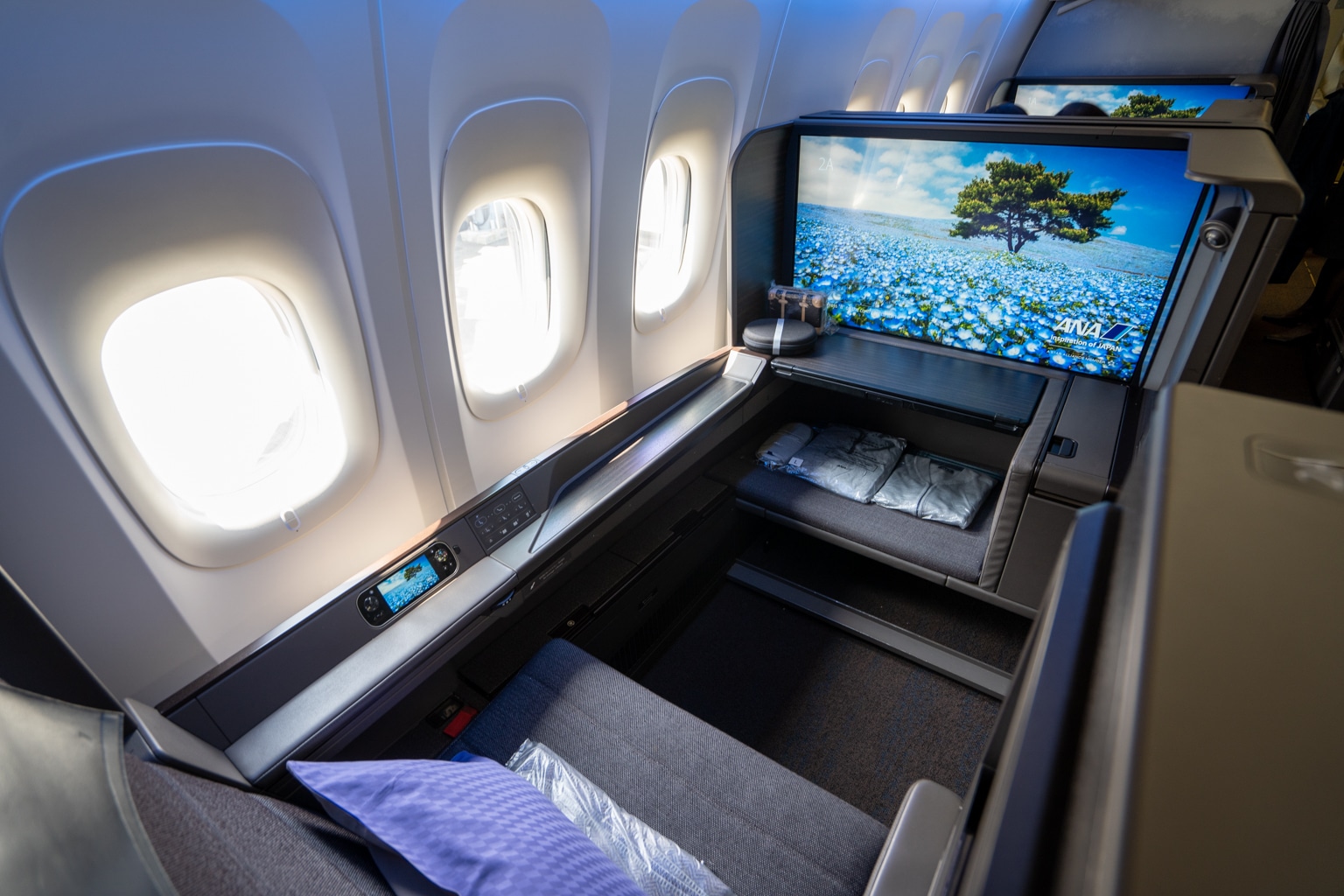
More recently, and especially in the past year, other parties have built businesses that create tools for finding award availability and offer access to the data they obtain on a for-profit basis. Users benefit from an easier summary of award availability, and businesses benefit from collecting membership fees in return.
Aeroplan takes the position that these websites are illegally accessing Aeroplan’s technology and data, and that they further enable fraud and misuse of the program with their features. He also stated that Aeroplan would be taking action to address this issue in the near future, and it appears that time has come.
ExpertFlyer Loses Access to Star Alliance Airlines
This week, ExpertFlyer sent out an email to subscribers, stating that its Award & Upgrade search would no longer support a number of airlines, due to “issues obtaining award and upgrade data”.
If you take a look at the airlines listed in the email, most of them belong to Star Alliance.
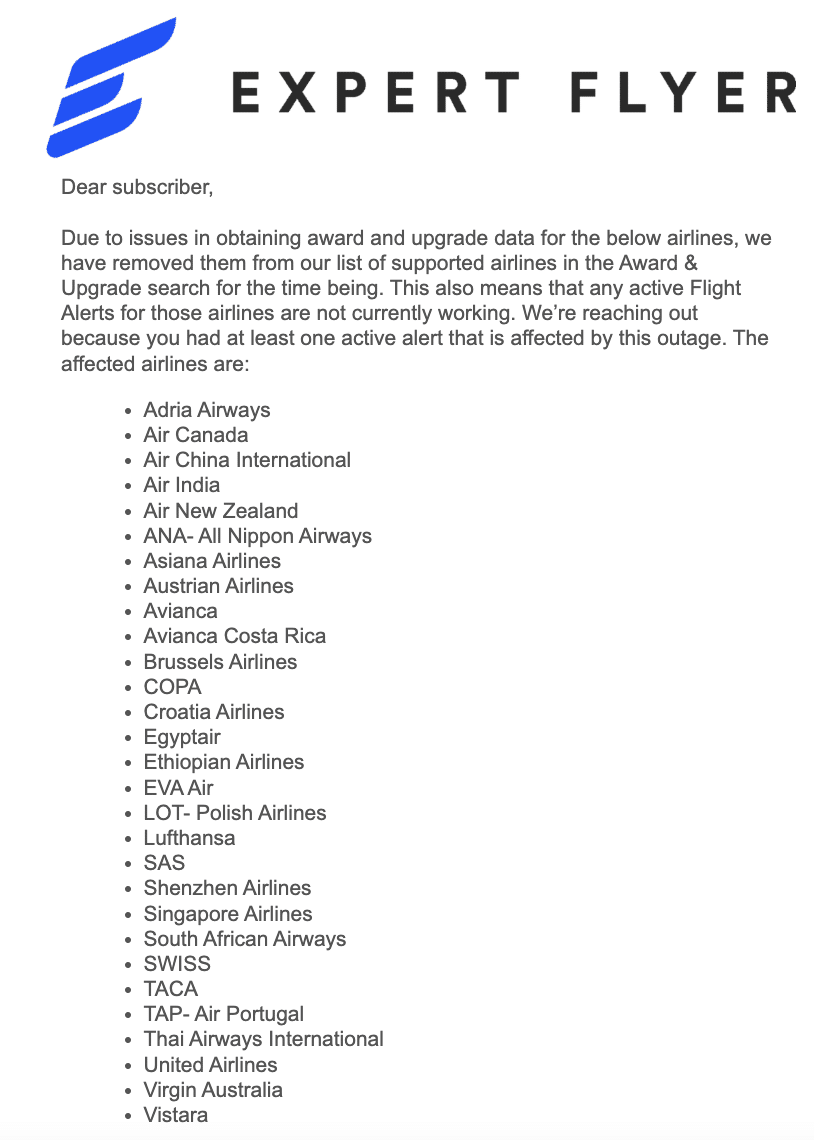
ExpertFlyer doesn’t explain exactly what the issues are, but it’s surely connected with how it obtains award availability data for the list of Star Alliance airlines – plus two non-alliance airlines, Virgin Australia and Vistara, which notably maintain partnerships with both Air Canada and United.
To remove such a large number of airlines from its Award & Upgrade search function at once is indeed a drastic step, and one that must have been prompted by a serious enough concern, especially since ExpertFlyer has been a mainstay of the loyalty community for years.
However, ExpertFlyer’s founder, Chris Lopinto, later wrote on X that the service did not scrape award availability from Air Canada and Aeroplan, which suggests that it’s not just Air Canada and Aeroplan behind the offensive but rather a larger group of Star Alliance airlines.
I can tell you that EF didn’t scrape from AC.
— Chris Lopinto (@chrislopinto) October 7, 2023
The data source wasn’t AC, and I wouldn’t hold out any hope that it’s coming back, sorry.
— Chris Lopinto (@chrislopinto) October 7, 2023
Air Canada Sends Cease & Desist Order to Seats.aero
Another third-party award-searching website, Seats.aero, sent an email to its members that it received a cease and desist order from Air Canada this week, in which Air Canada made it very clear that it wants Seats.aero to stop retrieving award availability from its website.
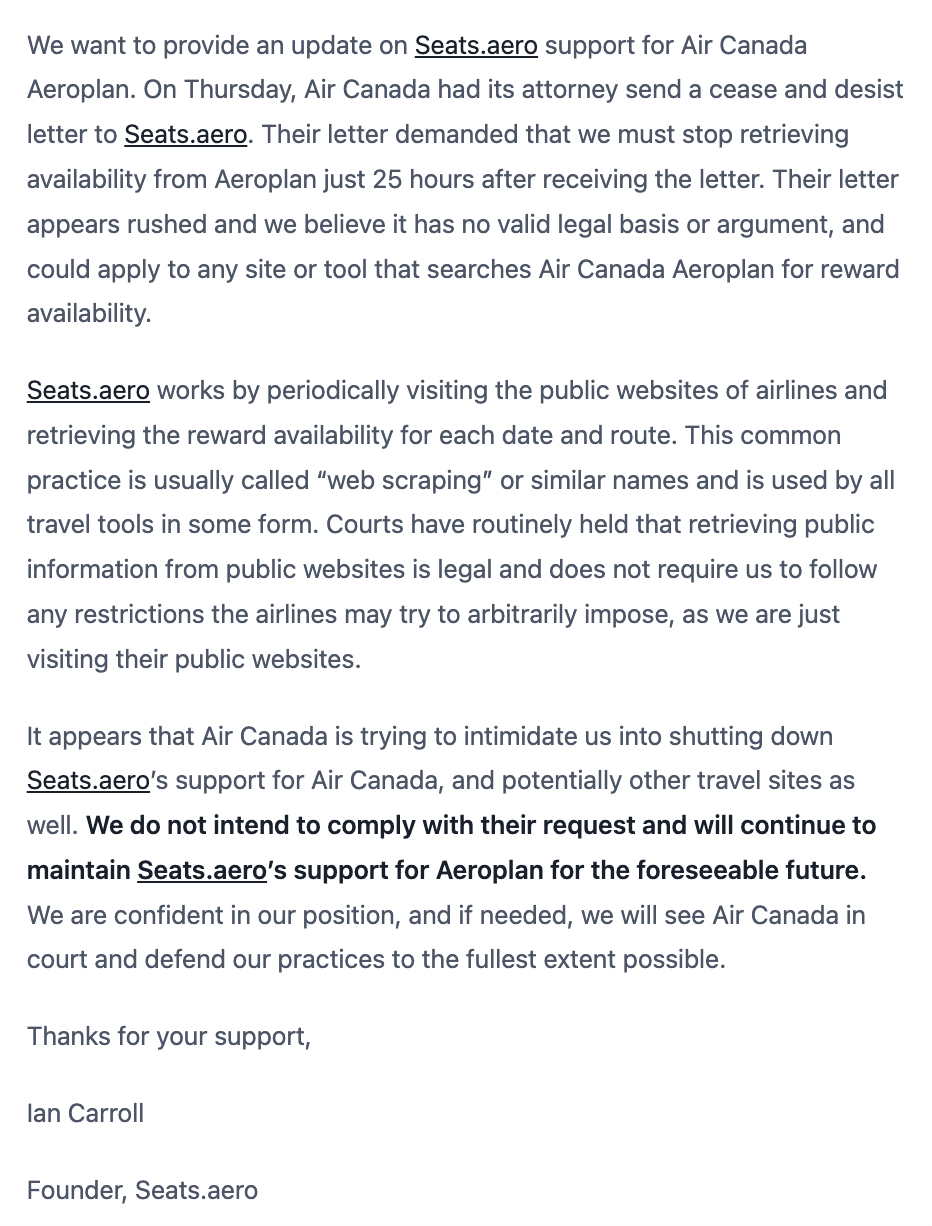
Unlike ExpertFlyer, Seats.aero has indicated that it doesn’t plan on changing its support for Aeroplan award availability for the foreseeable future.
It’s very likely that other third-party websites have received similar notices, and this issue is far from being resolved, especially if it has to play out in the courts.
The issue surrounding the legality of web scraping is indeed quite murky. Third-party websites maintain that what they’re doing is entirely legal, while airlines purport that scraping their websites for award availability is illegal and unauthorized.
However, it’s worth noting that the scraping activity doesn’t necessarily have to be illegal for airlines to be suffering consequences from it and wanting to put a stop to the practice.
Indeed, Aeroplan’s leadership had indicated that the scraping from these tools is putting a significant enough burden on airlines’ systems to impact the wider user experience.
There’s clearly a lot at stake here, and we can only speculate at what’s happening by zooming out of specific issues and looking at them from a broader level.
This Problem Is More Than a Sum of Its Parts
As part of the discussion in the livestream, Aeroplan’s leadership mentioned that while there are five separate issues affecting partner award availability, those five issues can interact with and build on each other.
If we leave out the issues of partners pursuing membership in other alliances (Oman Air joining Oneworld comes to mind) and phantom award availability, we might see how the remaining three issues work in tandem.
For example, it was indicated that Aeroplan has reason to believe that third-party websites are being used by nefarious actors to engage in fraud and misuse of loyalty programs.
The alleged fraud likely refers to the behaviour of points brokers, who gobble up premium award seats and sell them for a profit, which specifically goes against the terms and conditions of loyalty programs.
However, limiting access to third-party websites won’t necessarily fully combat the issue of points brokers, since there’s nothing preventing them from finding award availability and snagging up award seats as they always have. If anything, it just makes it a bit harder, but doesn’t prevent misuse entirely.
It’s worth noting that Aeroplan’s leadership mentioned on the livestream that they are actively working on issues surrounding fraud and misuse. Specifically, it was noted that misuse of the Family Sharing feature, as well as issues surrounding certain origin-destination pairs, are actively being addressed behind the scenes – so we’ll need to wait and see what action is taken here.

This week’s actions against third-party award search websites aren’t just designed to combat nefarious actors, though. As mentioned on the livestream, the sheer volume of searches being put through these websites are creating a strain on Aeroplan’s partner airlines’ systems and impacting their partner relationships.
At this juncture, it’s worth asking the question: why must the current state of affairs be resolved through anti-consumer measures like taking legal action against third-party search tools, rather than the opposite?
Why doesn’t Aeroplan, say, offer to reimburse their partners to offset the strain being put on their systems, and/or invest in leading an alliance-wide initiative to improve their partners’ technology platforms – all in the name of offering Aeroplan members a seamless and superior search experience that would negate the need for any third-party search tools to exist?
At the end of the day, it all comes down to commercial interests.
Loyalty programs don’t necessarily want to make it a whole lot easier for members to claim high-value award flights. Not only does this turn airlines’ liabilities into tangible expenses, it can also threaten to disrupt the balance of the loyalty ecosystem.
When you redeem Aeroplan points for a partner redemption in First Class, the program needs to reimburse their airline partner a hefty monetary sum. The more easily such high-value redemptions are made, the greater costs the program will need to bear to support them.
What’s more, the more easily such high-value redemptions are made, the fewer such redemptions remain for everyone else. The loyalty ecosystem has always existed in a delicate state of balance, which is something we often overlook as individual consumers looking to maximize our own gains.
In fact, let’s consider a thought experiment of taking the value proposition of third-party award search websites, like ExpertFlyer and Seats.aero, to their logical extreme. What would happen if every member of a loyalty program could search for and book their exact desired premium awards instantly and with zero friction?
If this were the case, then the value offered by loyalty programs falls apart, since all high-value awards would be snapped up nearly instantly, and the vast majority of members wouldn’t have been able to book any of the awards that may have drawn them to the program in the first place.
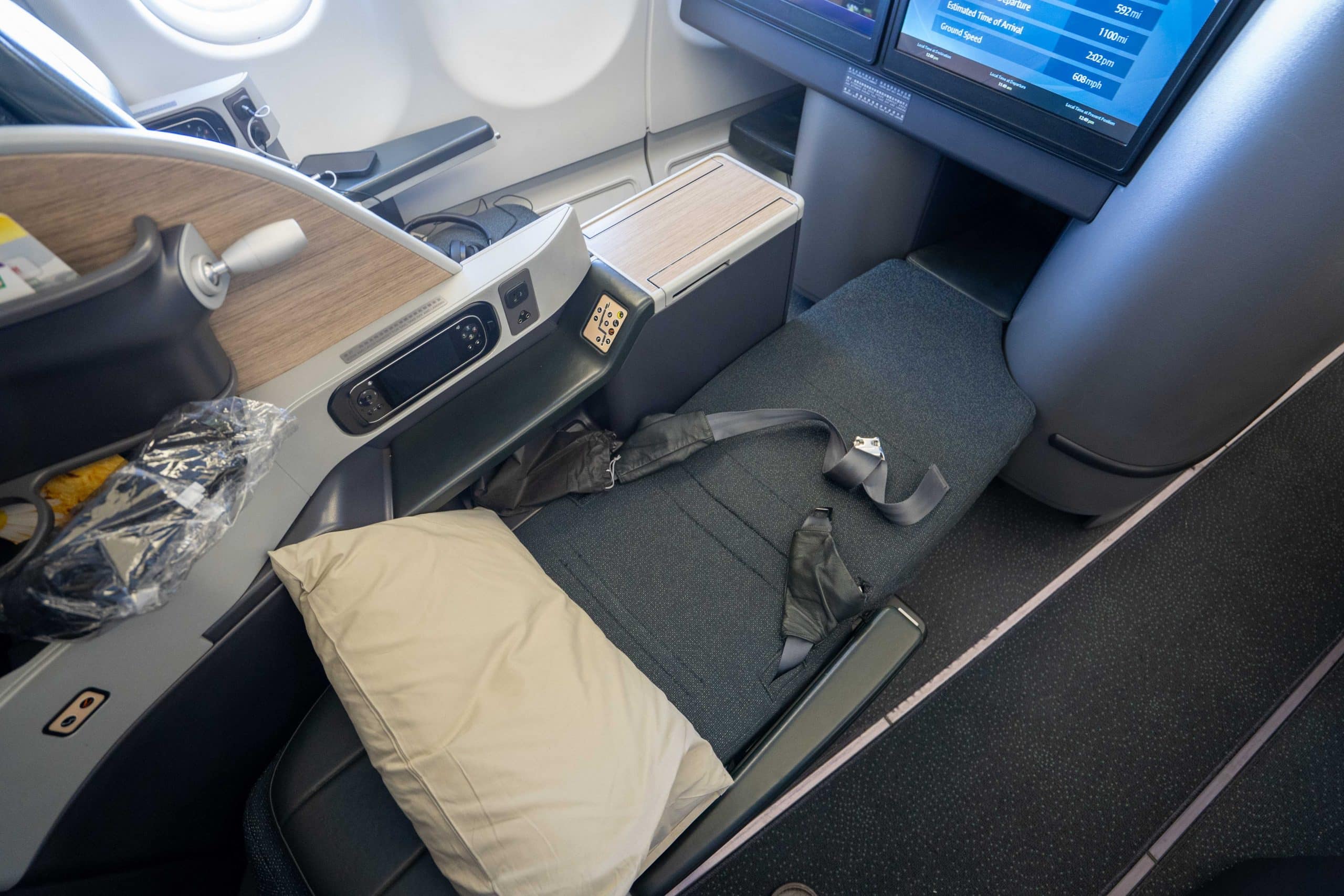
Indeed, it’s very much the feasible-yet-ever-so-elusive nature of premium awards that keeps loyalty programs interesting in the first place. Miles & Points offers outsized value by giving you something for “free” that’s otherwise very expensive to buy with cash – but you need to put in some work to get it.
(As a side note, there’s nothing that encapsulates this phenomenon quite like the presence of bad-faith fraudsters and points brokers who snap up all the availability to resell for a profit, is there?)
In this sense, we can see the airlines’ perspective of why they’d want to stop the proliferation of these third-party search tools before the ecosystem is thrown further out of balance – even if we may not agree with these actions as individual consumers, who now face greater friction in searching for the most desirable award redemptions out there.
Conclusion
This week, Star Alliance airlines took aim at third-party websites that scrape loyalty program websites for award availability through legal channels.
It appears that this is one of the steps being taken by Air Canada and other Star Alliance airlines to address fraud and misuse of loyalty programs. Some third-party websites maintain that they’re not doing anything wrong, while the airlines argue that the scraping is illegal and unauthorized.
It remains to be seen exactly how this will all play out, especially if it reaches a court of law, and we’ll be continually keeping an eye how things unfold from here.










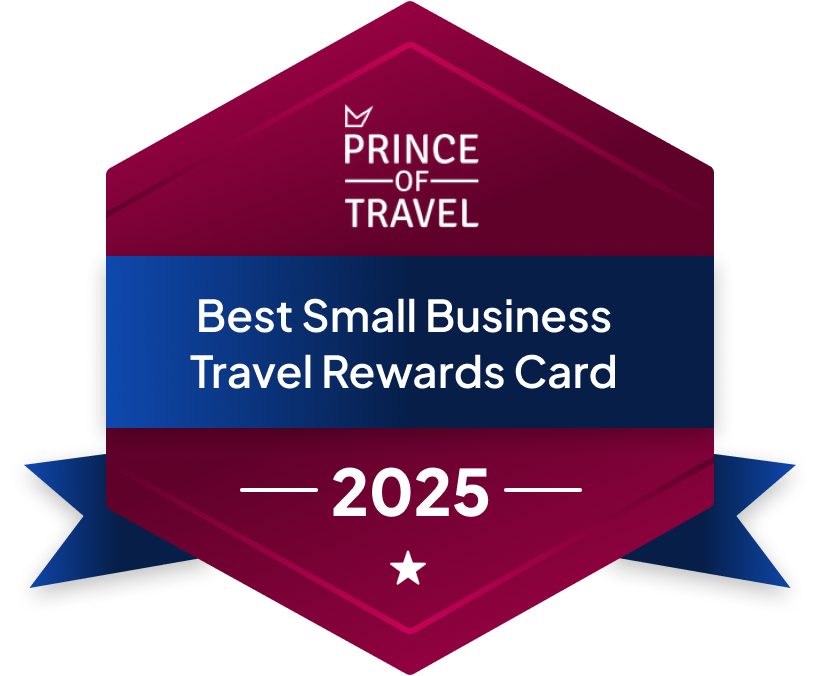









Let’s address the real issue with the airline systems. They cannot attract nor pay enough the IT talent needed to create and run a real-time system like theirs. Air Canada and Aeroplan, in particular, spent the money to rebuild their systems from the ground up in 2019/2020, but that technology talent has long left for greener pastures. The flyers are also getting smarter faster than the airline systems – thanks to all the other technology-enabled services they use – so the airlines must resort to “slowing things down”.
They have done so primarily by jacking up the AC metal reward miles, and now this round is for the partners. We’ll see how well it works. It’s always been a chase – like pressing one button or turning one knob but not knowing which other pressure system will blow.
Been booking more cash fares recently as I feel the rewards program has gone nuts.
Agree with David 💯 %
It’s called an award seat not game the system seat . It’s about time the freeloaders and professional beggars are checked . Revenue based status and hopefully an end to sign up bonuses all together will go a long way in returning “ loyalty “ programs to what they were intended to be .
Why? It’s capitalism. There’s clearly a need for this service and I’m 100% sure the courts will back up the consumer on this one.
I am glad that Star Alliance and Aeroplan are trying to block all these pay-to-find-seat and reward availability websites. Hopefully, websites will load faster for the average user. People doing all these searches slow down the system for everyone.
Well said.
Exactly